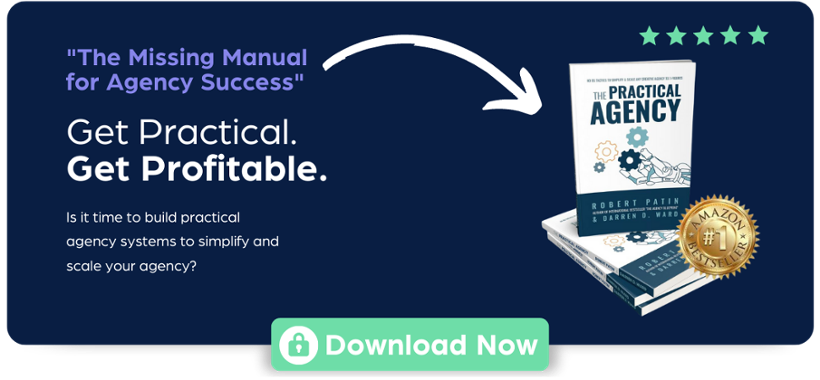How to Identify and Target High-Ticket Niches in Digital Marketing

Think back to the last 10 sales calls you’ve made. How many of them did you walk out feeling 100% about?
While it’s unrealistic to expect every call you facilitate will go perfectly, if less than 50% of your recent sales calls have converted, consider it your signal that it's time to take decisive action.
Every agency owner dreams of running a business that not only thrives financially but also aligns deeply with their personal values and passions. Yet, too many find themselves in a reality far from this ideal. Exhausted from the daily grind, their work no longer ignites passion but rather perpetuates a cycle of stress and disconnection.
This disconnect not only affects your personal well-being but also stifles your business’s potential. When your services are scattered across too many areas, it's challenging to present a compelling, cohesive narrative to your prospects. The result? Fumbled sales calls, unclear case studies, and a bank account that doesn't reflect your hard work.
The key is eliminating confusion from the equation altogether - which is where specializing your niche comes in. This isn’t just about improving your bottom line—it’s about reclaiming your confidence and ensuring that every sales call is an opportunity to demonstrate your agency’s unique value.
Are You Missing Out by Playing It Safe?
It's a common concern among agency owners: the belief that choosing a specific niche will limit their opportunities and consequently, constrict their business. However, any agency owner that has struggled with a nightmare client knows that sales success comes from prioritizing the quality, not quantity of leads.
If You’ve Been Dreading Niche Commitment - Here’s Why You Shouldn’t
When you narrow your focus to a specific niche, you're not shrinking your market—you're actually enhancing your ability to connect with it more deeply. Specialization allows for more precise and impactful sales strategies. Instead of a broad, generic approach that fails to resonate deeply with anyone, a niche focus means you can tailor your conversations, address specific pain points, and position your agency as the perfect solution to unique challenges.
This specificity not only increases the relevance of your offerings but also boosts the likelihood of conversion. Clients are more inclined to trust an expert who speaks their language and understands their industry's intricacies.
Sales Empowerment Through Specialization
As we navigate the crowded digital marketing landscape, where an average person is exposed to between 6,000 to 10,000 ads daily, standing out becomes critical. Here’s how specializing your niche can help grow your business faster:
- Streamline Your Efforts: By narrowing your focus, you increase your visibility within a specific target market. Knowing exactly who your audience is allows you to craft highly targeted marketing campaigns that address their unique needs, desires, and challenges.
- Enhance Community Penetration: When you understand where your prospective clients spend their time, your messaging can penetrate these communities more effectively, ensuring it resonates powerfully and elicits emotional, actionable responses.
- Boost SEO and Online Presence: In today’s digital marketing world, specificity enhances your SEO. Search engines favor content that answers specific questions and meets particular needs. By focusing on a niche, your content is more likely to rank higher, attract more qualified traffic, and generate leads that are likely to convert.
By debunking the myth that niching down limits your agency’s potential, we reveal how it actually paves the way for more effective sales and marketing strategies. Specialization doesn’t confine your business—it catalyzes its growth and sharpens its competitive edge.
Unpacking the Power of a Well-Defined Niche: Success vs. Ambiguity
Choosing the right niche is critical for the success of any digital marketing agency. The precision with which you select your focus can mean the difference between becoming an industry leader or just another player in the marketing game. Let's dive into what makes an effective niche, illustrated through a comparison between a highly focused niche and a more generalized one.
Effective Niche: Eco-Friendly Beauty Brands

Consider the niche of Eco-Friendly Beauty Brands seeking sustainable digital marketing strategies. This is a sharply defined niche targeting a specific type of client—those committed to sustainability and eco-conscious practices.
Agencies that specialize in this niche have the unique advantage of addressing distinct needs such as:
- Green SEO Practices: Implementing SEO strategies that highlight the eco-friendly aspects of products, using keywords that environmentally conscious consumers are likely to search for.
- Ethical Advertising: Crafting ad campaigns that resonate with the values of sustainability and ethical responsibility, ensuring that all promotional material reflects the brand’s commitment to the environment.
- Content Creation: Developing content that not only informs but also engages a community passionate about eco-friendly beauty. This might include blogs on sustainable practices, tips for eco-conscious living, or insights into the benefits of using eco-friendly products.
Agencies focusing on this niche can offer highly tailored services that are directly aligned with their clients' values, setting themselves apart from competitors who offer more generic solutions.
Vague Niche: Small Businesses in Digital Marketing
On the other end of the spectrum is the niche broadly defined as Small Businesses interested in digital marketing. This categorization is too expansive and lacks the necessary specificity. 'Small businesses' can vary greatly, encompassing everything from local bakeries to tech startups, each with vastly different digital marketing needs:
- Diverse Industries: A small IT firm and a local restaurant have fundamentally different audiences and marketing needs. A one-size-fits-all approach fails to effectively address the unique challenges and opportunities of each sector.
- Variable Market Sizes: The scope and reach desired by different small businesses can vary significantly. A local service may only want to target a small community area, whereas a tech startup might aim for a global presence, requiring very different marketing strategies.
- Different Customer Journeys: The path to purchase and the online behavior of customers in different sectors can vary greatly, necessitating customized marketing funnels and tactics that generic strategies simply cannot provide.
Without a more defined focus, marketing efforts for such a broad category are likely to be diluted and less effective, as they fail to address the specific needs, challenges, and values of any particular group.
This not only enhances the agency's ability to convert leads into loyal customers but also establishes a strong, differentiated presence in the marketplace. In contrast, a vague niche like 'small businesses interested in digital marketing' offers little in the way of differentiation or deep value, making it harder to stand out and succeed in a competitive digital landscape.
Your Checklist to Refine Your Target Market Vision
Worried that your current target market isn’t primed for scaling and heading to a plateau? Here’s our go-to checklist to help you view your creative agency a bit more objectively:
- Specificity: Can you define your target market in one sentence that includes demographic, geographic, and psychographic variables?
- Expertise: Do you have or can you develop deep expertise in this market’s specific needs and challenges based on your past experiences?
- Accessibility: Are you able to easily find and communicate with your target market through at least 2-3 established channels?
- Size: Is the market large enough to sustain your business but not so large that it's overly competitive or vague?
- Profitability: Does this market have the financial capacity to afford your services at a price point that’s profitable for your agency?
- Passion: Are you passionate about serving this market? Passion often translates into more authentic and engaging marketing efforts.
- Feedback Loop: Is there potential for a steady feedback loop that allows for continual improvement and adaptation of your services?
This checklist can help you critically assess whether your current focus is likely to propel your agency forward or hold it back. Gaining clarity on a well-defined niche not only enhances your ability to attract the right clients but also positions your agency as a specialized leader, paving the way for sustainable growth and scalability.
Leveraging a Niche to Sell High-Ticket Offers to Maximize Value and Expertise
When your agency specializes in a well-defined niche, you're not just fine-tuning your marketing efforts; you're also strategically positioning yourself to offer and command high-ticket services. This move allows your agency to capitalize on deep expertise and tailor your services to meet the precise needs of your clients, naturally leading to the ability to charge premium prices for the significant value you provide. This strategic focus not only heightens the perceived value among potential clients but also increases their willingness to invest in premium solutions that promise substantial impacts.
Understanding the Value of High-Ticket Offers
High-ticket digital marketing services typically involve comprehensive strategies that deliver substantial business growth, significant brand development, or complete digital transformations. These are not mere one-off projects but are extensive partnerships that drive measurable outcomes. The difference between low-ticket and high-ticket offers primarily lies in the depth of service, the complexity of solutions, and the long-term commitment both from the service provider and the client.
- Low-Ticket Offers: These services are usually straightforward, quick to deliver, and require less customization. They are perfect for agencies targeting startups or small businesses with limited budgets that need basic digital marketing services like social media management, basic SEO, or pay-per-click advertising. These offers are typically transactional and don't involve deep client-agency relationships.
- High-Ticket Offers: In contrast, high-ticket services are suited for agencies that aim to work closely with their clients over longer periods. These services are highly customized, addressing complex challenges and requiring in-depth expertise. They are ideal for agencies targeting larger businesses or specialized industries that are looking for comprehensive digital strategies, extensive brand makeovers, or advanced marketing automation setups. These clients value and are willing to pay for expertise and results that significantly impact their bottom line.
Benefits of Targeting High-Ticket Niches
When you choose to focus on a specific niche, you empower your agency to:
- Create offerings that are uniquely tailored to address the specific challenges or opportunities within your niche. This specialization often brings more value to your clients, as the solutions are directly aligned with their most pressing needs.
- Gain a deeper understanding of your clients' industries and needs. This insight allows you to build higher trust and foster longer engagements, which are crucial for maintaining high-ticket contracts.
- Position your agency as an expert in a particular area. This reputation can help attract more qualified leads who are willing to pay premium prices for proven expertise and results.
- Be seen as a specialist in a lucrative niche enhances your agency's brand, setting you apart from competitors who offer more generic services.
Agencies aiming to sell high-ticket offers must be prepared to invest in developing top-tier capabilities, including advanced analytical tools, a skilled team capable of delivering complex solutions, and robust client support systems to manage and nurture high-value relationships. Investing in these areas will not only support the delivery of high-ticket services but also help increase your agency’s income effectively, solidifying your status as the go-to expert in your niche.
Navigating Challenges in High-Ticket Digital Marketing
While high-ticket digital marketing offers considerable benefits, it comes with its set of challenges too, like:
- High client expectations for both the process and the results. Agencies need to establish clear communication channels, set realistic expectations, and provide regular updates to keep clients engaged and satisfied.
- The pressure to deliver exceptional results can be intense, so agencies must ensure they have the expertise and resources to meet the demands of high-ticket projects consistently.
- Higher stakes with high-ticket clients can make scaling operations challenging. Agencies must refine their project management and client service processes to handle the increased workload without compromising quality.
By understanding and preparing for these challenges, agencies can effectively manage high-ticket digital marketing engagements and enjoy the substantial rewards they offer. In the next section, we’ll explore how to use high-ticket digital marketing strategies to drive significant sales growth.
Addressing Common Misconceptions in High-Ticket Digital Marketing
As you explore high-ticket digital marketing to drive substantial sales, it's crucial to address and dispel some common misconceptions that can derail your efforts:
- More Spending Equals More Leads Many agency owners believe that significantly increasing their advertising budget is necessary to generate more leads. While paid advertising is an effective tool, it's not the only strategy for attracting high-ticket clients. Focusing solely on spending more can lead to inefficient use of resources. Instead, aim for targeted advertising combined with strong organic strategies like SEO, content marketing, and strategic partnerships which often yield a better ROI.
- High-Ticket Means High Complexity Another common fallacy is that high-ticket services must be inherently complex or difficult to deliver. In reality, the value of high-ticket offers often lies in their ability to solve significant problems simply and effectively. Simplifying your services into streamlined, understandable packages can make them more attractive to potential clients by clearly demonstrating the direct benefits and outcomes.
- Quick Wins Are the Best Wins In the rush to see immediate results, some agencies prioritize short-term gains over long-term relationships. High-ticket digital marketing should focus on building lasting relationships that yield higher lifetime value, rather than just quick conversions. This involves nurturing leads with high-quality, informative content, and consistent follow-up that emphasizes the long-term benefits of your services.
- All High-Value Clients Require Custom Solutions While personalized service is critical, this doesn’t necessarily mean every aspect of your service must be custom. Systematizing certain elements of your service delivery can increase efficiency without compromising on personalization. This approach allows you to handle high-ticket clients more effectively, ensuring that each client feels valued and understood without necessitating entirely bespoke solutions for each one.
- You Need to Be Everywhere at Once Spreading your marketing efforts across every available channel can dilute your impact. Instead, focus on channels where your high-ticket prospects are most active. This concentrated effort not only improves your chances of engaging with the right audience but also increases your marketing’s effectiveness.
By addressing these misconceptions, you can fine-tune your high-ticket digital marketing strategy to be both efficient and powerful, enabling your agency to attract and retain valuable clients without falling into common traps that might hinder your growth.
Measuring and Adapting High-Ticket Marketing Efforts
To ensure the success of your digital marketing efforts, it’s crucial to define, measure, and adapt your efforts based on Key Performance Indicators (KPIs). These metrics can help you fine-tune your approach to better meet the needs of your niche market and optimize the outcomes of your campaigns.
Key KPIs to Track
- Customer Acquisition Cost (CAC): Measure how much it costs on average to acquire a new client through your high-ticket marketing efforts. This will help you determine if the investment in a particular marketing channel is worth the returns.
- Customer Lifetime Value (CLTV): High-ticket items should ideally lead to a higher lifetime value. Calculate the total revenue you can expect from one customer over the course of their relationship with your agency to ensure that it significantly exceeds the CAC.
- Conversion Rates: Track the conversion rate at each stage of your sales funnel, from lead to customer. This will help you identify bottlenecks or stages where prospects drop out and allow you to make necessary adjustments.
- Return on Investment (ROI): This is crucial for evaluating the profitability of your high-ticket items. Measure the ROI of different marketing campaigns and channels to prioritize those delivering the best results.
- Engagement Metrics: For high-ticket items, engagement like time spent on your website, interactions on social media, and webinar attendance can indicate interest level and potential for conversion.
Your Strategy Building Checklist
To build a strategy that effectively targets your chosen niche and maximizes the impact of your high-ticket offerings, follow these steps:
- Define Your Target Audience: Who are they? What are their business needs, challenges, and goals? Understanding these will help you tailor your marketing messages more effectively.
- Develop Value-Driven Content: Create content that addresses the specific pain points and aspirations of your target audience. This could include whitepapers, detailed guides, webinars, or case studies that demonstrate your expertise and the tangible benefits of your services.
- Optimize Your Sales Process: Ensure that your sales team is well-versed in the specifics of your high-ticket offers and trained to handle objections and close deals effectively.
- Leverage Technology: Use CRM and marketing automation tools to nurture leads effectively, maintain communication, and deliver personalized experiences that can increase conversion rates.
- Test and Adapt: Use A/B testing for your marketing campaigns to find out what resonates best with your target audience. Regularly review your KPIs and adapt your strategy based on what the data tells you.
- Focus on Client Relationships: High-ticket sales are often about relationships rather than transactions. Invest in building strong relationships with key decision-makers in your target market.
Common Challenges & Quick Solutions
By following these steps and regularly reviewing the relevant KPIs, you can build a solid strategy that not only reaches but resonates deeply with your target market, encouraging them to take action and choose your agency for their high-ticket needs.
However, here are the common mistakes agency owners most often make you’ll want to watch out for:
- Misalignment Between Product Offerings and Market Needs
If your high-ticket services or products do not fully meet the evolving needs of your target market, you’re risking lower conversion rates and client engagement.
The solution? Regularly collect feedback through surveys, client interviews, and engagement metrics. Use this data to quickly adjust your offerings or develop new ones that better address the specific needs of your target audience.
- Overlooking Client Lifetime Value
Focusing too much on acquiring new clients rather than nurturing existing ones can lead to a decrease in overall client lifetime value.
The solution? Implement client retention strategies, such as regular check-ins, personalized offers, and loyalty programs. These efforts can enhance client satisfaction and encourage long-term relationships, ultimately boosting lifetime value.
- Inadequate Response to Competitive Actions
Competitors can introduce new offerings or adjust their strategies at any time, putting pressure on your market position and potentially diverting your clients.
The solution? Stay informed about your competitors' actions through market research and competitive analysis. Develop rapid response strategies that might include introducing complementary services, enhancing existing offerings, or adjusting pricing models to retain competitive edge.
- Inefficient Use of Marketing Budgets
Spending too much on channels or tactics that do not yield a significant return will drain resources that could be better used elsewhere.
The solution? Regularly review the performance of all marketing channels using clear metrics like ROI and CAC. Shift budgets quickly from underperforming channels to those that offer better returns. Experiment with new platforms or strategies that could potentially offer higher engagement and conversions.
- Failure to Adapt to Technological Changes
New technologies and platforms emerge that could enhance your marketing efforts, so slow adoption will hamper your agency's efficiency and appeal.
The solution? Keep a proactive stance on technology by training your team on new tools and integrating them into your workflow as soon as they prove to be beneficial. Attend industry workshops, webinars, and conferences to stay ahead of technological advancements.
Prioritizing Quick Action to Navigate High-Ticket Marketing Challenges
Efficiently managing the unique challenges of high-ticket digital marketing hinges not only on recognizing potential issues early but also on the ability to act swiftly and decisively. Maintaining agility and responsiveness in your strategic approach is crucial for staying competitive and achieving substantial revenue growth.
You can streamline this process by:
- Setting clear alerts and implement a system of KPIs and alerts to continuously monitor performance indicators. This system should promptly notify you and your team whenever metrics significantly deviate from established benchmarks.
- Empowering your team by delegating decision-making authority and empower your team to take action. By reducing bottlenecks in the decision-making process, you speed up the implementation of necessary adjustments, ensuring that your agency remains nimble and effective under various conditions.
- Creating a flexible strategy that includes contingency plans and flexible tactics, which can be adjusted swiftly based on real-time performance data and market feedback. This flexibility ensures that your marketing efforts can quickly align with changing market dynamics, client needs, or competitive pressures.
Building a Targeted Messaging Strategy for Your Specialized Sales Funnel
In the competitive landscape of digital marketing, a finely tuned messaging strategy that resonates deeply with your chosen niche is crucial. As you hone in on a specific audience, your communication should not only capture attention but also engage them on a personal level. Here's a structured approach to creating a messaging strategy that turns prospects into devoted clients, aligning closely with your expertise and passion to maximize your agency's magnetism.
Your Step-by-Step Guide to Crafting A Niche Messaging Strategy
- Deeply Understand Your Audience
- Dive into the needs, desires, pain points, and aspirations of your niche audience. Use data-driven insights from market research, previous interactions, and customer feedback.
- Goal: Craft messages that resonate on a personal level, ensuring they speak the language of your audience and address their specific concerns.
- Create Value-Driven Content
- Develop content that positions your agency as the solution to the unique challenges of your niche.
- Examples: Insightful blog posts, informative videos, and compelling case studies that provide actionable insights and showcase your deep understanding and passion for the niche.
- Personalize Your Communications
- Segment your audience and tailor communications to meet them at each stage of their buyer’s journey.
- Detail: Personalization should reflect a deep alignment with their business cycle, providing solutions to current problems and anticipating future needs.
- Ensure Consistency Across All Channels
- Maintain a consistent core message across all platforms, from social media to email marketing.
- Importance: Consistency builds strong brand recall and reinforces your position as a trusted expert in your niche.
- Test and Refine
- Continuously test and refine your messaging based on feedback and performance.
- Method: Utilize A/B testing to determine what resonates best, and adjust your strategy to keep it effective as market dynamics evolve.
- Engage in Meaningful Conversations
- Encourage interaction with your content and provide personalized responses to foster deeper connections.
- Result: These engagements enhance client relationships and increase the likelihood of conversion.
Converting Engaged Leads into Loyal Clients
Once you've captured the attention of your leads with targeted messaging, the next crucial step is effective conversion. This process should be seamless and reflective of the expectations you've set through your strategic communications.
- Align Expectations with Reality
- Ensure your service offerings are clearly defined and that your team can deliver on every promise. This alignment builds trust and reduces the risk of client dissatisfaction.
- Streamline the Closing Process
- Keep the closing process swift and efficient to maintain momentum and prevent prospects from second-guessing their decision.
- Proactively Address Objections
- Anticipate and address potential objections before they arise, weaving prepared responses into your discussions to demonstrate foresight and attentiveness.
- Maintain a Personal Touch
- Continue to engage your prospects with the same personal touch that attracted them, making each interaction feel collaborative and client-focused.
- Deliver with Excellence
- Follow through on every detail promised in your proposal and continue to engage your new client with unwavering enthusiasm and commitment.
Choosing a niche that aligns with your personal expertise and passion is crucial. When you communicate in a language that is natural to you, it enhances your authenticity and magnetism, making you irresistible to your dream clients. This authenticity ensures that your messaging strategy not only captures attention but also builds lasting relationships, turning prospects into loyal clients who are aligned with the core values and strengths of your agency.
The Choice That Defines Your Agency's Future
The decision of who you choose to target with your creative agency is pivotal—it can make or break your entire business. Targeting the right niche allows you to speak authentically and passionately, making your marketing efforts not just seen but felt. This resonance is what transforms interest into engagement and pitches into partnerships.
As you consider the path forward, remember that narrowing your focus to impact key areas is not just beneficial; it's essential. This pivotal decision has the power to not only transform your business but also enrich your professional life, providing a clear direction and renewed purpose. Are you ready to lead in your niche and redefine the scope of your agency’s success? The time to act is now—because in the realm of digital marketing, timing isn’t just crucial; it’s everything.
Want to learn more? Watch our video below about Why 90% of Creative Agencies FAIL. Check out our Youtube Channel for more industry insights.










